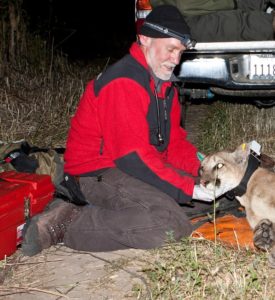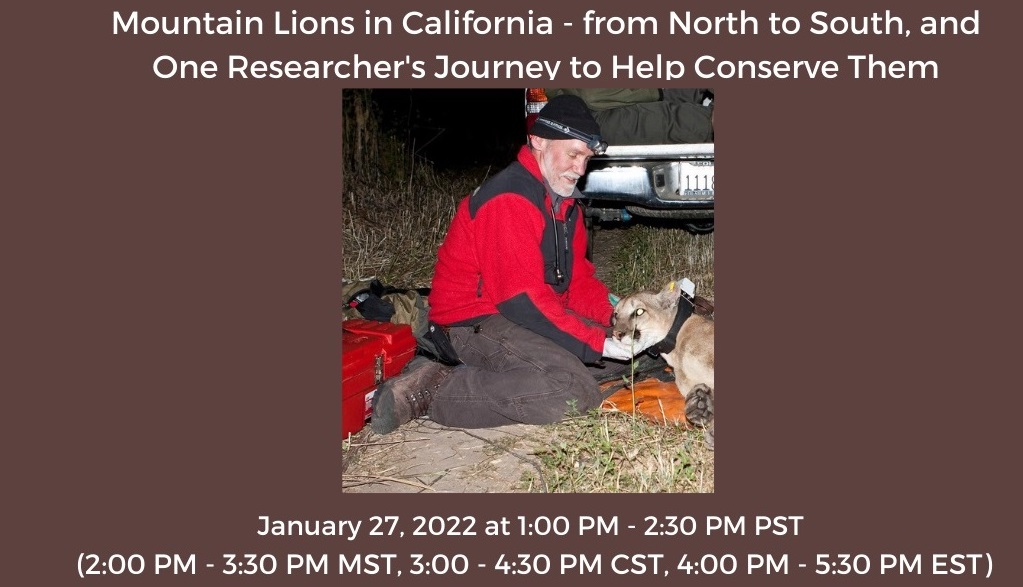Mountain Lions in California – from North to South, and One Researcher’s Journey to Help Conserve Them

Winston Vickers is a wildlife veterinarian with the UC Davis Wildlife Health Center who has conducted research into mountain lions in California for the last 20 years. In that time, he and collaborators, and other researchers in the state, have learned a vast amount about the mountain lion populations in California, and unfortunately the news has often not been good. The accumulated research has shown that connections between populations across the state have been restricted or in some cases mostly severed to the point of ten separate subpopulations being identifiable genetically. Several of these subpopulations are at risk of significant decline or extirpation due to low annual survival rates, inbreeding, and worsening habitat loss and fragmentation. In this talk Dr. Vickers will detail the latest scientific findings from across the state that are guiding actions that may increase the odds of long term persistence of puma populations, what individuals can do to assist in their conservation, and will talk about his personal pathway into mountain lion research and conservation.
About Dr. Winston Vickers
 Dr. Vickers is a wildlife research veterinarian with the University of California-Davis Wildlife Health Center and the Institute for Wildlife Studies. He obtained his DVM at Oklahoma State University and practiced on large, small, and exotic species for over 20 years before returning to school to get his Master of Preventive Veterinary Medicine at UC Davis with a focus on wildlife disease and ecology. He has been studying mountain lions and other wildlife for 20 years and directs the UCD Wildlife Health Center’s mountain lion study. He collaborates extensively with other mountain lion researchers, NGO’s, and governmental agencies in the state and elsewhere in the West, and his studies of mountain lions address issues of mortality, connectivity, habitat use, genetics, disease, conservation, and reducing negative interactions with humans and livestock. He also collaborates on studies involving other wildlife species studies, including bobcats, Channel Island foxes, Santa Cruz Island scrub jays and other avian species. He worked for many years with the Wildlife Health Center’s Oiled Wildlife Care Network on oil spill response, and is the author or a co-author of over 35 peer reviewed publications, one book chapter, and numerous white papers and reports to wildlife and other government agencies. He co-developed and directed a 9-part series of short educational documentaries about mountain lions, as well as a one hour film, that have been viewed nearly 1.8 million times and can be viewed here (https://www.camountainlions.com/). His work has been featured in numerous articles in the newspapers and in several books, and he has twice been named one of the 100 most influential individuals in Orange County, CA by the Orange County Register.
Dr. Vickers is a wildlife research veterinarian with the University of California-Davis Wildlife Health Center and the Institute for Wildlife Studies. He obtained his DVM at Oklahoma State University and practiced on large, small, and exotic species for over 20 years before returning to school to get his Master of Preventive Veterinary Medicine at UC Davis with a focus on wildlife disease and ecology. He has been studying mountain lions and other wildlife for 20 years and directs the UCD Wildlife Health Center’s mountain lion study. He collaborates extensively with other mountain lion researchers, NGO’s, and governmental agencies in the state and elsewhere in the West, and his studies of mountain lions address issues of mortality, connectivity, habitat use, genetics, disease, conservation, and reducing negative interactions with humans and livestock. He also collaborates on studies involving other wildlife species studies, including bobcats, Channel Island foxes, Santa Cruz Island scrub jays and other avian species. He worked for many years with the Wildlife Health Center’s Oiled Wildlife Care Network on oil spill response, and is the author or a co-author of over 35 peer reviewed publications, one book chapter, and numerous white papers and reports to wildlife and other government agencies. He co-developed and directed a 9-part series of short educational documentaries about mountain lions, as well as a one hour film, that have been viewed nearly 1.8 million times and can be viewed here (https://www.camountainlions.com/). His work has been featured in numerous articles in the newspapers and in several books, and he has twice been named one of the 100 most influential individuals in Orange County, CA by the Orange County Register.


